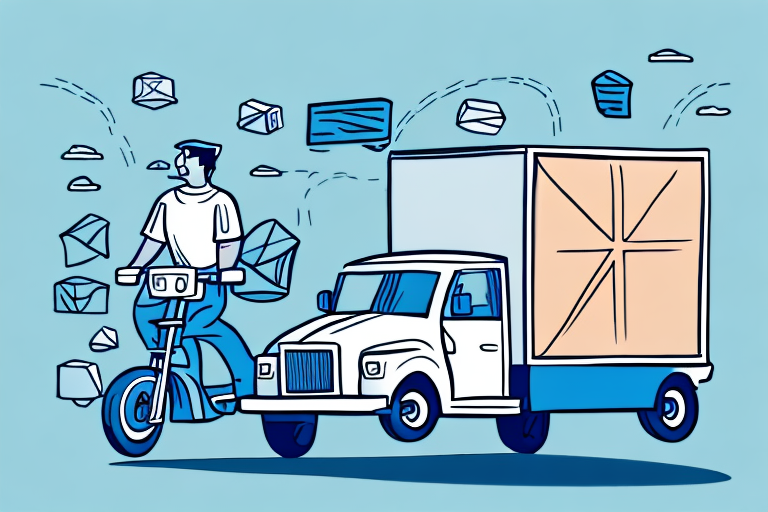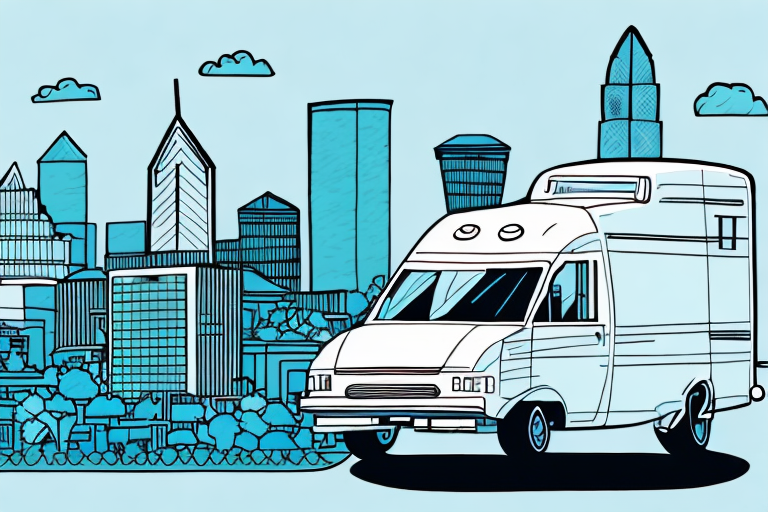Exploring Package Courier Jobs: What You Need to Know
If you're considering a career as a package courier, there are several factors to take into account. Package courier jobs can be highly rewarding, but they also require a significant investment of time and effort. In this article, we'll explore the ins and outs of package courier jobs, from the growth of the industry to the qualifications and skills required of couriers. We'll also cover the benefits and challenges of the job, as well as the role of technology in the industry. Finally, we'll provide tips on how to find and apply for package courier jobs, as well as advice on staying safe on the job.
The Growth of the Package Courier Industry
Package delivery is a booming industry, showing no signs of slowing down. As consumers continue to shop online, the demand for package couriers has risen sharply. According to the Bureau of Labor Statistics (2023), employment of package delivery drivers is projected to grow by 7% from 2022 to 2032, faster than the average for all occupations.
The rise of e-commerce is a primary driver for this growth. With more people shopping online, there is a greater need for reliable and efficient package delivery services. Moreover, the COVID-19 pandemic has accelerated the shift towards online shopping, as people have been encouraged to stay at home and avoid crowded stores.
Another factor contributing to the industry's expansion is the increasing demand for same-day and next-day delivery. Customers are willing to pay extra for faster delivery times, and many retailers are now offering these options to stay competitive. This demand has led to the development of new technologies and logistics systems to ensure that packages are delivered quickly and efficiently.
Types of Package Courier Jobs Available
There are several types of package courier jobs available, each with its own responsibilities:
- Package Delivery Drivers: Responsible for transporting packages from the warehouse to the customer's door.
- Package Sorters: Work in warehouses sorting packages and preparing them for delivery.
- Courier Dispatchers: Schedule deliveries and coordinate with drivers to ensure timely service.
- Logistics Coordinators: Manage the flow of goods from origin to destination, optimizing routes and delivery schedules.
Qualifications and Skills Needed for Package Courier Jobs
To secure a package courier job, candidates typically need:
- A high school diploma or equivalent.
- A valid driver's license with a clean driving record.
- Physical fitness to handle lifting and carrying packages.
- Strong communication skills to interact with customers and team members.
- Good sense of direction and knowledge of the local area.
- Proficiency with technology, such as GPS devices and handheld scanners.
Additionally, reliability and a strong work ethic are essential, as couriers often work independently and must manage their time effectively to ensure timely deliveries.
The Benefits of Working as a Package Courier
Working as a package courier offers several benefits, including:
- Flexibility: Many courier jobs offer flexible schedules, allowing workers to manage their own time.
- Physical Activity: The role involves a lot of walking, lifting, and moving, which can be beneficial for physical health.
- Competitive Pay: Many companies offer competitive salaries and benefits packages, including health insurance, retirement plans, and paid time off.
- Independence: Couriers often work independently, which can be appealing for those who prefer autonomy.
- Exploration: The job allows couriers to explore different neighborhoods and areas within their delivery routes.
Moreover, working as a package courier can provide valuable skills in time management, customer service, and logistics, which are transferable to other careers.
Challenges Faced by Package Couriers on the Job
While there are many benefits, package courier jobs also present several challenges:
- Physical Demands: The job requires lifting heavy packages and being on the move for extended periods, which can lead to physical strain.
- Time Pressure: Couriers often work under tight deadlines to ensure timely deliveries, which can be stressful.
- Traffic and Navigation: Navigating through traffic, finding addresses, and securing parking can be difficult, especially in urban areas.
- Safety Concerns: Couriers may encounter hazardous conditions, such as aggressive pets or adverse weather.
Addressing these challenges requires resilience, adaptability, and strong problem-solving skills.
The Role of Technology in Package Courier Jobs
Technology plays a critical role in the efficiency and safety of package courier jobs. Key technological advancements include:
- GPS and Route Optimization: Advanced GPS systems help couriers find the most efficient routes, reducing delivery times and fuel costs.
- Electronic Scanners and Mobile Devices: Handheld scanners and mobile devices allow couriers to track packages in real-time and communicate effectively with dispatchers.
- Automated Warehousing Systems: Automation in sorting and packaging helps increase accuracy and speed in the delivery process.
- Contactless Delivery Options: Technologies that enable contactless deliveries have become more prominent, enhancing safety and convenience for both couriers and customers.
These technological tools not only improve efficiency but also enhance safety by providing real-time updates and alerts, thereby minimizing risks during deliveries.
How to Find and Apply for Package Courier Jobs
There are various ways to find and apply for package courier jobs:
- Online Job Boards: Websites like Indeed and LinkedIn list numerous courier job openings.
- Company Websites: Visit the career pages of major delivery companies such as UPS, FedEx, and Amazon to find job postings.
- Local Courier Services: Reach out to local courier companies directly to inquire about job opportunities.
- Networking: Leverage professional networks and connections to discover job openings.
When applying, tailor your resume and cover letter to highlight relevant experience and skills, such as previous delivery or customer service roles, proficiency with navigation tools, and any relevant certifications.
Interviewing Tips for Package Courier Job Applicants
Preparing for a package courier job interview involves several key steps:
- Research the Company: Understand the company's operations, values, and the specifics of the courier role.
- Prepare Your Resume: Highlight relevant experience, especially in delivery, customer service, and any related skills.
- Demonstrate Reliability: Emphasize your punctuality, work ethic, and ability to manage time effectively.
- Showcase Problem-Solving Skills: Be ready to discuss how you've handled challenges in previous roles, such as navigating difficult delivery situations.
- Prepare for Common Questions: Questions may cover your driving record, physical ability to handle the job's demands, and how you manage deadlines.
Additionally, bringing copies of your resume, references, and any relevant certifications can help make a positive impression.
Understanding the Compensation and Benefits Package for Package Couriers
Package courier jobs typically offer competitive compensation and benefits, which may include:
- Salary: Competitive hourly wages or annual salaries, varying based on experience and location.
- Health Insurance: Coverage options for medical, dental, and vision care.
- Retirement Plans: 401(k) or other retirement savings plans.
- Paid Time Off: Vacation days, sick leave, and holidays.
- Bonuses and Incentives: Performance-based bonuses for meeting delivery targets or other milestones.
It's important to research and compare the compensation and benefits packages offered by different companies to ensure you are receiving a competitive and fair offer. Additionally, consider factors such as company culture and opportunities for professional growth when evaluating job offers.
Advancement Opportunities in the Package Courier Industry
The package courier industry offers multiple pathways for career advancement, including:
- Supervisory Roles: Experienced couriers can advance to supervisory positions, overseeing teams of delivery drivers or managing specific routes.
- Specialized Positions: Opportunities in areas such as logistics coordination, fleet management, or route planning.
- Cross-Training: Gaining skills in related areas like package sorting or dispatching to open up additional career pathways.
- Management Programs: Some companies offer management training programs, enabling couriers to move into higher-level administrative or operational roles.
Additionally, some employers provide resources for further education and training, such as tuition reimbursement or certification programs, to support employees' professional development.
Common Misconceptions about Package Courier Jobs
Several misconceptions can deter individuals from pursuing package courier jobs:
- It's an Easy Job: Contrary to popular belief, courier jobs can be physically demanding and require a variety of skills, including customer service, navigation, and time management.
- Limited Career Path: While entry-level positions are common, the industry offers many opportunities for growth and advancement.
- No Technology Use: Modern courier jobs heavily rely on technology, including GPS systems, mobile devices, and automated logistics software.
- Low Pay: Many courier positions offer competitive salaries and comprehensive benefits packages, especially with major delivery companies.
Understanding the realities of package courier jobs can help individuals make informed career decisions and recognize the value and opportunities within the industry.
Top Companies Hiring for Package Courier Positions
If you're seeking a package courier job, consider applying to leading companies known for their extensive delivery networks and employee benefits:
These companies offer a variety of courier roles across different regions, providing opportunities to find a position that aligns with your skills and career goals.
Tips for Staying Safe on the Job as a Package Courier
Safety is paramount for package couriers. Here are some tips to stay safe on the job:
- Use Proper Lifting Techniques: Avoid injuries by using correct methods for lifting and carrying packages.
- Wear Appropriate Gear: Suitable clothing and footwear are essential for mobility and protection.
- Stay Alert: Be aware of your surroundings, especially when delivering packages in unfamiliar areas or encountering aggressive animals.
- Follow Traffic Laws: Obey speed limits, traffic signals, and parking regulations to ensure safe driving.
- Secure Packages: Properly secure packages in your vehicle to prevent falls or damage during transit.
- Use Technology Wisely: Leverage safety features in delivery apps and GPS systems to navigate safely and communicate any issues promptly.
By adhering to these safety practices, couriers can minimize risks and maintain their well-being while performing their duties.
Success Stories from Experienced Package Couriers
Many package couriers find their roles to be highly rewarding, citing the following experiences:
- Sense of Independence: The ability to work independently and manage one's own schedule is a significant benefit.
- Meeting New People: Couriers enjoy interacting with a diverse range of customers, building community connections.
- Skill Development: On-the-job skills such as time management, problem-solving, and customer service are invaluable assets for future career endeavors.
- Career Growth: Many couriers have advanced to supervisory or specialized roles within their companies, reflecting the potential for career progression in the industry.
However, couriers also recognize the challenges, especially during peak delivery seasons, which require adaptability and resilience. Overall, the package courier profession offers a blend of independence, physical activity, and opportunities for personal and professional growth.






















